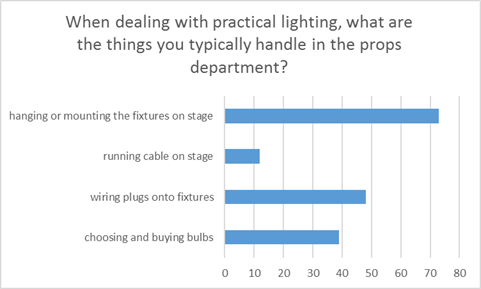I started a survey a few weeks back to gather some information for my upcoming book, The Prop Effects Guidebook. While most of the answers were only relevant to me, I thought I would share the results of one of the questions.

Ninety-eight people answered the above question, which is a good chunk of props people. I also had a short text box so people can clarify their answers, and that received forty-eight responses.
A number of respondents stipulated that while they will often mount fixtures on the set, such as sconces, any hanging fixtures will be handed over to the rigger or carpenter.
A small few stated they were responsible for the whole practical; everything from choosing the decorative fixture to getting a bulb in and wiring the thing. Basically, when they hand it off to the electrics department, it just needs to be plugged in. On the other hand, at least a dozen people stated they were responsible solely for sourcing or building the fixture itself; adding a bulb and wiring it is all done by electrics, while mounting or hanging are the purview of scenery.
For another small percentage, this was the typical practice at their theatre, but the props department was ready to help out with the wiring of practicals if the electrics department got swamped.
For the prop departments responsible for bulbs, most people clarified that they based their bulb choice off what the lighting designer wanted or what the electrics department suggested. Others elucidated that they were responsible for bulbs which were a visible element, such as period incandescents.
A similar response happened with plugs; if the lamp has an Edison plug which was a visible part of the world, it is more likely to be props’ responsibility. If the fixture had a cord that ran offstage, the stage pin connector is probably put on by Electrics.
This survey was a fascinating glimpse into how various other theatres work. Even something as simple as sticking a lamp on a table can be handled in a variety of ways. One respondent works at a theatre that does not even have an electrics department! If I were to take a guess, I would bet that many theatres operate the way they do based on the traditions of who has worked there in the past. If the props department never had anyone able to wire a lamp, then over time, the electrics department would just take that job over.
That being said, being able to make a lighting fixture function is a skill which new props people should be learning. If you end up working at a theatre where the electricians do all that, great, but you may end up at a job where it is your responsibility.
Also, in my own opinion, you can find so many interesting and fun things in the world of lighting today, from EL wire to LED tape and more. Many electricians live in the world of Source 4s and giant PAR lamps, and may not be aware of all the cheap, tiny lighting stuff that exists outside of the theatrical world. A props person can bring that knowledge to the table and help open up more possibilities to the production.




